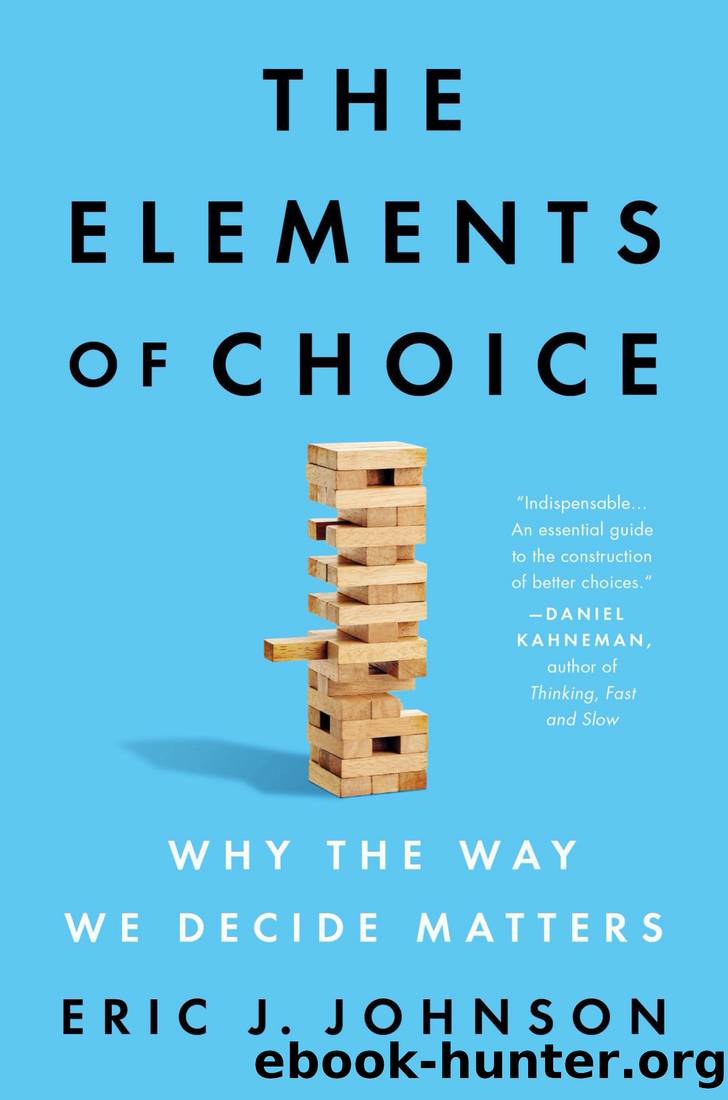The Elements of Choice by Eric J. Johnson

Author:Eric J. Johnson [Johnson, Eric J.]
Language: eng
Format: epub
Publisher: Penguin Publishing Group
Published: 2021-10-12T00:00:00+00:00
Sorting Things Out
There is another example of order that you see all the time on the web: sorting options by an attribute, like from cheapest to most expensive. When we order things by an attribute, we make some paths easier to use, and that can make an attribute more important. In all the examples until now, weâve been looking at how the order of options affects choices. Whether they are bands at Eurovision, wines at a tasting, or movies on the Netflix landing page, we considered the options as a whole. The designer is putting things in order in a way that they think makes sense, whether to maximize sales, as with Expedia, or alphabetically, for political candidates.
Sorting options by a particular attribute will also have an effect on choices. You see this kind of sorting every day online. For example, visit Google Flights and look for any set of flights, and the list that it returns will be ordered by one attribute: price. You, the chooser, can sort the options many different ways with just a click. But the designer sets the default sorting order: cheapest first.
Sorting by a single attribute makes that attribute more important to the chooser. If the options are sorted by price, you will be more likely to choose the cheapest flight. To use the technical term, you will appear more price sensitive. Sort cars by gas mileage, and people will be more sensitive to fuel economy. Sort restaurants by distance, and people will be more sensitive to the time it takes to get there.12
I was a consultant on a project that looked at how to design websites for school choice. The group, organized by the research and consulting firm Mathematica, found something rather striking. The previous chapter mentioned one trade-off between two key qualities of any school: its academic quality and its distance from the studentâs home. This group looked at what schools were chosen when the list was sorted either by academic performance or by distance. This is a challenging trade-off for families: Would you want your fourteen-year-old to commute an extra half mile to attend a better school? How much better does a school need to be to justify that lost time? This trade-off is a great example of having to assemble a preference. Since people make choices for a given school level rarely, usually once per kid, we might expect this to be an instance where preferences are constructed. If so, the effect of sorting might be large.
The Mathematica team gave different versions of the selection website to more than three thousand parents. They found that sorting made a difference in what families chose: even though parents could change the sort order with a click, the default sorting attribute mattered. When the list was sorted by academic performance, for example, families chose schools that were better (by 5 percentage points on a 100-point scale) and farther away (by 0.6 miles, which was a 30 percent increase from the average of 2.0 miles).
Download
This site does not store any files on its server. We only index and link to content provided by other sites. Please contact the content providers to delete copyright contents if any and email us, we'll remove relevant links or contents immediately.
Time Management Made Easy: How to Cultivate New Habits, Improve Productivity and Get Things Done by Joshua Strachan(2418)
The 7 Habits of Highly Effective People by Stephen R. Covey & Sean Covey(2267)
The Concise Laws of Human Nature by Robert Greene(1914)
Doesn't Hurt to Ask by Trey Gowdy(1638)
Primal Leadership by Daniel Goleman(1283)
Hook Point: How to Stand Out in a 3-Second World by Brendan Kane(1246)
Don't Sweat the Small Stuff...and It's All Small Stuff by Richard Carlson(1121)
HBR's 10 Must Reads 2021 by unknow(1097)
The Power of 100! by Shaun King(1097)
Amazon Unbound by Brad Stone(1045)
100 Things Successful People Do by Nigel Cumberland(1030)
Master of One by Jordan Raynor(1008)
HBR's 10 Must Reads 2021 by Harvard Business Review(1007)
The Job Closer by Steve Dalton(994)
Lives of the Stoics by Ryan Holiday & Stephen Hanselman(969)
Declutter Your Mind: A step by step guide to learn to control your thoughts, stop worrying, relieve anxiety and eliminate panic attacks and negative thinking by Mia Chandler(968)
Conflicted by Ian Leslie(872)
The Book of Hope by Jane Goodall(872)
Coders at Work: Reflections on the craft of programming by Peter Seibel(848)
